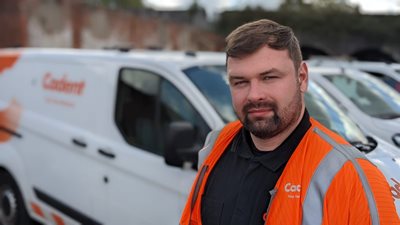- Advice issued about dangers of carbon monoxide (CO), and symptoms
- Case study: two serious incidents within 48 hours in Liverpool
- The importance of an annual gas service check and CO alarms
An emergency gas engineer pulled two people from separate houses within 48 hours, as deadly carbon monoxide almost killed them.
During Carbon Monoxide Awareness Week, Dan Howard (pictured below) shared details of the dramatic turn of events that led to him carrying the two seriously ill individuals from their homes in Merseyside late last year, just two days apart.
His hope is that by sharing this story – and educating people to the dangers of carbon monoxide – it may save lives or serious illness.
“I couldn’t believe it – less than 48 hours from carrying a fella over my shoulder, down the stairs, to get him outside, I was at another incident where I had to do almost the same thing,” said 30-year-old Dan.

The first incident happened at an upstairs flat in central Liverpool.
Dan, who has worked for Merseyside’s gas emergency service Cadent for nine years, said: “The customer had been reading one of our leaflets, which described the symptoms of carbon monoxide. He’d been feeling unwell, so called us out, thinking it was possible this is what was happening to him.
“When I arrived, I turned the gas off and completed all my checks. The customer was upstairs, in a front room, slurring his words and very lethargic. It didn’t look good. He told me there was a boiler in the kitchen, where the door was closed. I used my kit to check the edges of the door and the readings started to rise dramatically.
“I opened all the windows and told the customer we had to get out, by hell or high water we had to get out. He said he couldn’t move – so I put him over my shoulder and got him outside. I learned later that he was in intensive care for days and, if he’d stayed in the house for just a few more hours, he would most likely have died. Unfortunately, his home didn’t have any carbon monoxide detectors.”
The second incident happened in Kirkby.
Dan was called out on Boxing Day. A family had celebrated Christmas together the day before when the occupant complained of feeling unwell. After putting her to bed ‘to sleep it off’, the rest of the family left and returned early next day to check on her. By this point, a carbon monoxide alarm had activated – and the family called the gas emergency service (Cadent).
“When I got there, I isolated the gas and ventilated the property. I could see the customer had lots of tell-tale symptoms – red eyes, red face, things like that. What can catch you out is that the symptoms are a lot like a hangover.
“I immediately rang for an ambulance and informed them of the severity of the situation, due to the CO readings throughout the property. I assisted the customer to a safe place and waited for the paramedics. Next thing, three incident support units arrived and she was treated for CO poisoning.”
Both incidents were traced to defects with boilers.
While such dramatic incidents do not normally happen at such rapid frequency, they do happen more than they should.
“It never ceases to amaze me that people don’t get an annual gas service, and don’t always install CO alarms. I know times are hard, but this isn’t something that’s worth taking a risk about.
“Book a Gas Safe registered engineer to carry out your service and pick up a CO alarm – or alarms – for as little as £15 from many retailers. It could save your life, or your family.”
Find out more at
www.cadentgas.com/CO
What is Carbon Monoxide?
Carbon monoxide (CO) is a highly poisonous gas that you can’t see, hear, smell, taste, or touch, which is why it is known as the silent killer.
Every year in England and Wales, there are around 40 deaths because of carbon monoxide poisoning.
It is produced by the incomplete burning of carbon fuels that are commonly found in the appliances many of us use to heat our home and cook our food.
Why is it dangerous?
Anyone can be affected and it’s important to know what symptoms to look out for. They can be similar to viral infections, or a hangover. If your symptoms lessen or disappear when you’re out of the home, it might be carbon monoxide poisoning.
The main symptoms are
- Headache
- Dizziness
- Breathlessness
- Nausea or feeling sick
- Collapse
- Loss of consciousness
If you are worried you’ve been exposed to carbon monoxide and are showing any of the symptoms, you should seek medical help.
The signs of carbon monoxide
There are a number of signs, but as this is a gas you cannot touch, smell, taste, see or hear – there is no better way to protect yourself than having an annual gas service and installing CO alarms.
- Gas flames appear ‘floppy’ and burn orange or yellow, rather than mostly blue
- Pilot light frequently blows out
- There is soot or yellow-brown staining on or around an appliance
- You have excessive condensation in the room where you have an appliance
If you spot any of these signs, it does not mean there is definitely a release of CO, but it is better to be safe than sorry and get them checked.
What to do if you suspect carbon monoxide
- Open all windows and doors
- Move outside into fresh air
- Call the national gas emergency service on 0800 111 999 (all calls are recorded and may be monitored)